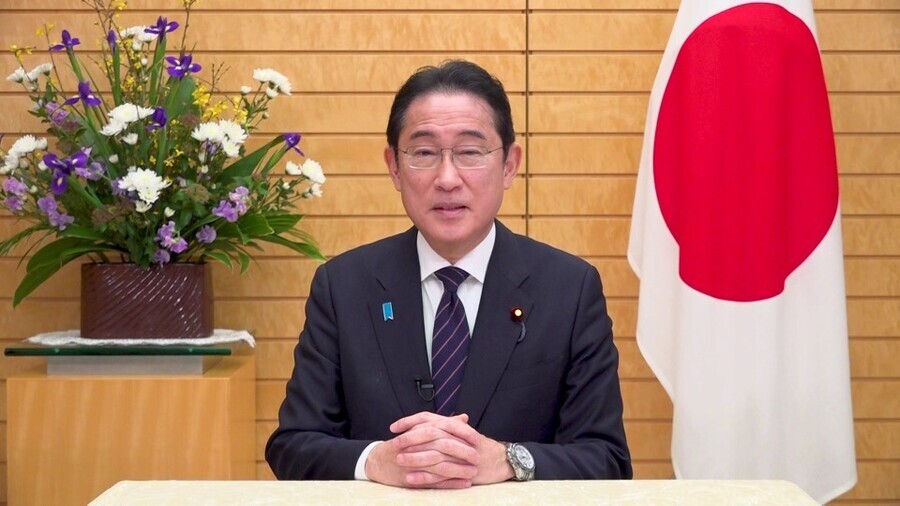hankyoreh
Links to other country sites 다른 나라 사이트 링크
[Column] The day when the leaders of North Korea and Japan meet is within sight


By Kim Jong-dae, visiting scholar at Yonsei Institute for North Korean Studies
A report Monday by a Japanese media outlet stating that Prime Minister Fumio Kishida will travel to Pyongyang in June for a summit with North Korean leader Kim Jong-un left me stunned.
The Japanese government did not deny any part of the report.
The following day, in response to a reporter’s question asking if the Pentagon supports Japan’s diplomatic outreach to North Korea, deputy press secretary Sabrine Singh stated, “We want to see regional stability in the region. If those conversations lead to that, we certainly welcome that.”
These sentiments aren’t some bolt from the blue. Japan’s Chief Cabinet Secretary Yoshimasa Hayashi laid the groundwork for these developments on Feb. 16, by stating that Kishida “has been advocating for a summit with North Korean leader Kim Jong-un to resolve various pending issues between the two countries. The prime minister has stated that he would like to hold high-level discussions with Pyongyang to realize the summit.”
The statement was made in response to senior Workers’ Party of Korea official Kim Yo-jong’s statement that there is “no reason” for the two countries not to become close, and her suggestion that the Japanese prime minister could even visit the North.
Although the two countries disagree on the issue of Japanese abductees to North Korea, it is clear that they are putting a serious emphasis on dialogue.
Of course, many are still skeptical of the possibility of a summit between Japan and North Korea. But what’s become abundantly clear is that the behind-the-scenes contact the two countries have engaged in since last year is an important variable in the situation in Northeast Asia.
Japan’s current approach to North Korea is distinctly different from that of the past, highlighting the country’s more generous side as a great power. As outlined in its national security strategy, revised in December 2022, Japan has increased its defense spending by 50 percent and the changes in its military command structures and policies to prepare it to intervene if a crisis erupts on the Taiwan Strait are nearly complete.
If Japan manages to create a unified command center for self-defense forces with land, sea and air capabilities in 2024, the country will be equipped with a military readiness to swiftly intervene in a Taiwan conflict alongside US forces stationed in Japan.
Without such a command center, the Japan Self-Defense Forces (JSDF) had been relegated to rear support troops, unable to share joint rules of engagement with the US military and therefore unable to respond to crises in the region.
Furthermore, the chief of staff of the Joint Staff functioned more as a general staff member who assisted the prime minister and cabinet than as a commander in combat, putting the position far from the realities of war.
The current situation has changed with the creation of a unified command center, which could quickly deploy the entire JSDF into combat and make them coordinate actions. To match such changes, US Forces Japan are also establishing a coordination body to facilitate joint operations with the JSDF.
Earlier this year, as the military reorganization was being finalized, the Japan Air Self-Defense Force (JASDF) even conducted joint air exercises on the Korean Peninsula with the South Korean and US air forces.
After paving the way for Japan’s stealth fighter jets to enter South Korea’s zone of operations, the Yoon Suk-yeol administration must have felt that the JSDF had pulled off some great metamorphosis, rendering it no longer incompetent and out of touch with war.
The rise of Japan as a muscular force to be reckoned with likely made the country’s government anxious about retaliation from the mainland. While Japan was building its military and alliance system to contain China, North Korea remained an unwelcome obstacle and flashpoint.
The Japanese government believes that North Korea needs to be managed appropriately in order to finalize its military transformation and focus its military power on Taiwan without too much hassle.
Wouldn’t it be a tactical strategy worthy of a great power if Japan filled the diplomatic vacuum created by the failure of South Korea and the US to engage in dialogue with North Korea?
In 2024, Japan overtook South Korea in economic growth and is fast becoming Asia’s largest investment destination. Although politically it is a mess, its stock market is booming at an all-time high, and as a safe investment destination for capital withdrawing from China, Japan is clearly reemerging as the focal point of Asia.
This current Japan is showing dignity and class, a far cry from the incompetent South Korean government, which only preaches “peace through strength,” saying that dialogue with North Korea signifies only a “false peace.”
Unlike the administration in South Korea, which is using the rhetoric of hatred and ideology in its diplomatic dealings, Japan is quietly and systematically realizing its aspirations for greatness.
China and Russia recognize Japan as an important competitor and partner in regional affairs, but are shunning South Korea by paying it no mind.
The fateful moment in which the leaders of North Korea and Japan meet and the possible return of Trump to the White House at the end of the year is within sight.
If South Korea, which is gradually running out of steam and entering a decline, does not prepare a new national political strategy in 2024, we will be relegated to chasing after Japan, unable to shape our own destiny.
This scenario depicts the failure of South Korea. With less than 50 days until the general election, these are the circumstances we need to consider when we think about casting our votes.
Please direct questions or comments to [english@hani.co.kr]

Editorial・opinion
![[Editorial] Perilous stakes of Trump’s rhetoric around US troop pullout from Korea [Editorial] Perilous stakes of Trump’s rhetoric around US troop pullout from Korea](https://flexible.img.hani.co.kr/flexible/normal/500/300/imgdb/original/2024/0509/221715238827911.jpg) [Editorial] Perilous stakes of Trump’s rhetoric around US troop pullout from Korea
[Editorial] Perilous stakes of Trump’s rhetoric around US troop pullout from Korea![[Guest essay] Preventing Korean Peninsula from becoming front line of new cold war [Guest essay] Preventing Korean Peninsula from becoming front line of new cold war](https://flexible.img.hani.co.kr/flexible/normal/500/300/imgdb/original/2024/0507/7217150679227807.jpg) [Guest essay] Preventing Korean Peninsula from becoming front line of new cold war
[Guest essay] Preventing Korean Peninsula from becoming front line of new cold war- [Column] The state is back — but is it in business?
- [Column] Life on our Trisolaris
- [Editorial] Penalties for airing allegations against Korea’s first lady endanger free press
- [Editorial] Yoon must halt procurement of SM-3 interceptor missiles
- [Guest essay] Maybe Korea’s rapid population decline is an opportunity, not a crisis
- [Column] Can Yoon steer diplomacy with Russia, China back on track?
- [Column] Season 2 of special prosecutor probe may be coming to Korea soon
- [Column] Park Geun-hye déjà vu in Yoon Suk-yeol
Most viewed articles
- 1[Editorial] Perilous stakes of Trump’s rhetoric around US troop pullout from Korea
- 2Nuclear South Korea? The hidden implication of hints at US troop withdrawal
- 3Behind-the-times gender change regulations leave trans Koreans in the lurch
- 4‘Free Palestine!’: Anti-war protest wave comes to Korean campuses
- 5[Photo] ‘End the genocide in Gaza’: Students in Korea join global anti-war protest wave
- 6In Yoon’s Korea, a government ‘of, by and for prosecutors,’ says civic group
- 7Korean president’s jailed mother-in-law approved for parole
- 8[Guest essay] Preventing Korean Peninsula from becoming front line of new cold war
- 9AI is catching up with humans at a ‘shocking’ rate
- 10Dermatology, plastic surgery drove record medical tourism to Korea in 2023